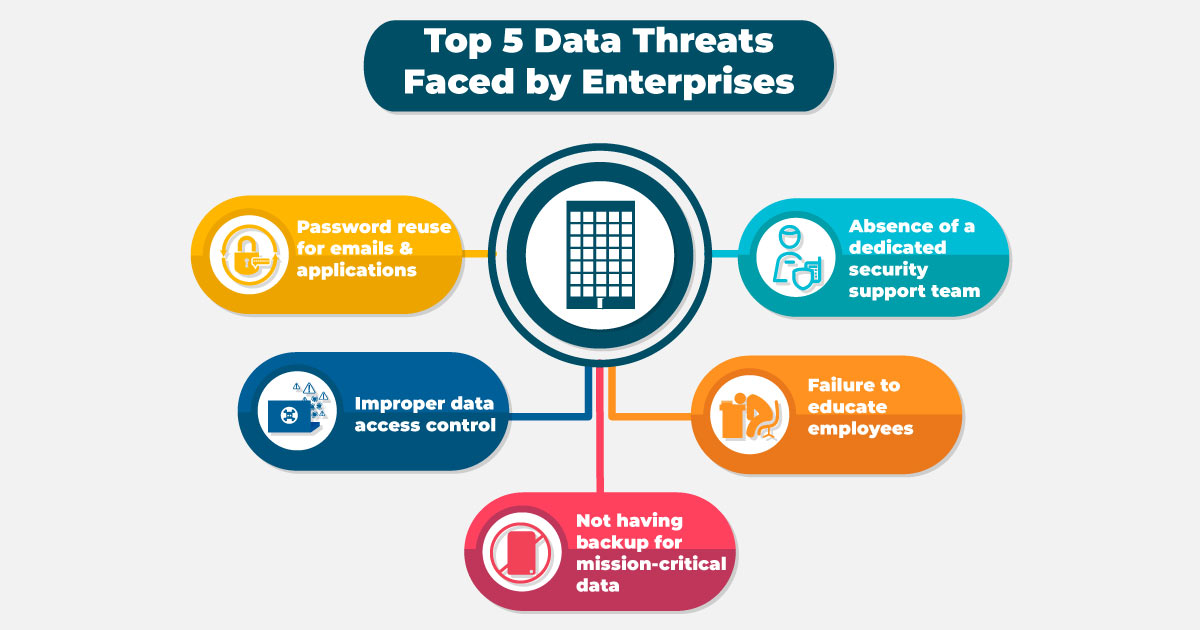Data is being generated faster than ever, and in more locations than organizations can track. The global shift to a hybrid work model is further pushing companies to embrace seamless and secure connectivity. Now, fosters collaboration from anywhere in real-time but also risks such as a massive increase in digital footprint or data fragmentation.
Protecting data from corruption and unauthorized access protects a business from financial losses, reputational harm, losing customer trust, and finally loss of brand image. Enterprises need to ensure compliance due to government rules and regulations. In the absence of which, they will lose business.
According to a Gartner report, many enterprises need to make concrete efforts to strengthen their privacy regulation efforts to comply with various jurisdictions. It predicts that the average annual budget of large enterprises for privacy will exceed $2.5 million by 2024.

- Password reuse for emails and applications and weak password strength work as bait for hackers who can exploit the account.
- Improper data access control by allowing everyone in the company to access all data spills out critical and sensitive information like customer information, financials, acquisition plans, etc.
- Many businesses, large and small, often overlook the need for periodic data backup. It is critical to start by backing up mission-critical data first.
- Failure to educate employees on common attack threats who fall victim to phishing and other popular scams hackers use to entice users.
- In the absence of a dedicated security support team, outsourcing security to service providers with the specialized knowledge to properly configure and keep systems and applications safe is a good idea.
Data governance is a principled approach to managing data during its lifecycle that clearly defines policies, procedures, responsibilities, and controls regarding data activities. This application ensures that information is collected, maintained, used, and disseminated ensuring the organization’s data integrity and security needs.
There are clear guidelines that typically include policies related to privacy, security, access, and quality, also covering the roles and responsibilities of those implementing policies. This helps employees to discover and use data to its complete potential.
A data governance platform comprises the following three key components.
- A defined framework for users to stick to while handling data and enforcing data policies.
- Effective processes to control, oversee and direct all data assets on-premises systems, on the cloud, and on the data warehouse platforms.
- Identifying and implementing the right tools and technologies to ensure data policy compliance.
What is Microsoft Purview?
Microsoft Purview helps organizations enable better data governance practise by enabling data discovery, traceability, and searchability. It helps create more efficient business operations by creating a provision for employees to search and discover relevant organizational data, helping them streamline data operations and prevent duplicate/redundant projects across multiple teams.
Purview is an enterprise-focused data platform aimed at data and risk management bringing about a secure development of hybrid work scenarios. It is a unified data governance solution that helps enterprises manage and govern their on-premises, multi-cloud, and SaaS data. It helps manage and protect data and helps consumers to find valuable and trusted data. It automates the discovery of data by screening and classifying it as a service for data asset resources.
Purview is based on:
- Automatic detection of data lineage, classification, and identification
- A unified map of data resources and their relationships helps effective data governance
- An exhaustive glossary with technical and business search terms to facilitate data discovery
- Information on the location and movement of sensitive data across the data landscape
This service is cloud-based and so the data remains in its current location while a copy of the metadata gets generated in Microsoft Purview, along with a location reference. Once this gets registered, users can add additional metadata and other users will be able to annotate descriptions, tags, etc.
Data has undeniable importance in the modern world, and Gemini Consulting & Services can help enterprises leverage the power of data effectively. Contact us to us to understand more about Microsoft Purview and how it can be used to obtain insights from data and create value.
How Microsoft Purview Helps Businesses?

The data discovery and traceability capabilities offered by Purview empower teams with the ability to operate more efficiently by helping to eliminate the time and cost associated with building redundant dashboards and data pipelines. Thus, BI and data engineers can focus on projects that add to the organization’s bottom line or support requests for visualizations that need to be implemented.
Purview allows users to map and control sensitive data (including during the data discovery phase) by marking the data as sensitive in its metadata. This will help organizations leverage additional group policies on top of Microsoft Purview to restrict the ability to search unnecessary data. This enables organizations to realize the benefits of this application even when sensitive or protected data is involved, while still maintaining regulatory compliance.
It is built over Apache Atlas- an open-source project for metadata management and governance. The latest edition of the Purview Data Catalog is based on Apache Atlas and extends full support for Apache Atlas APIs combining the capabilities of Azure Purview with tools from Microsoft 365. With an emphasis on unified data and risk management, it combines established cataloging and classification functionality with updated data loss prevention and compliance tools.



